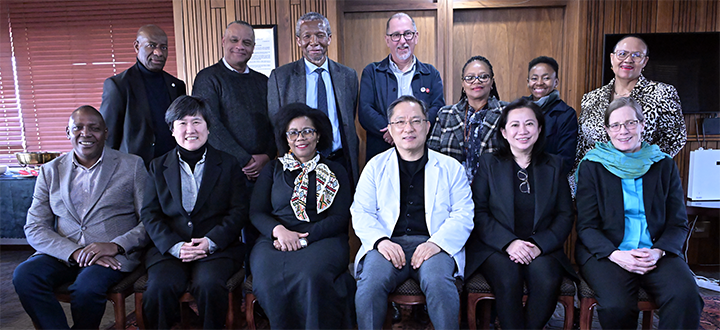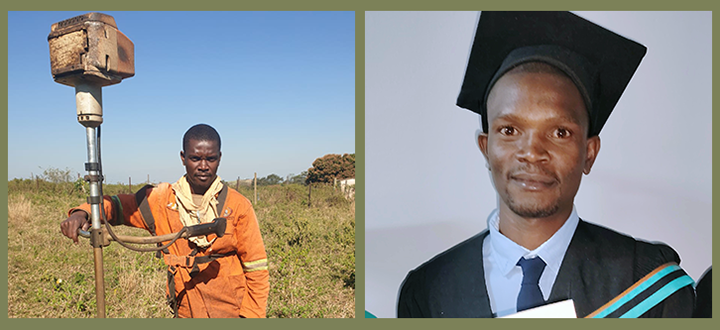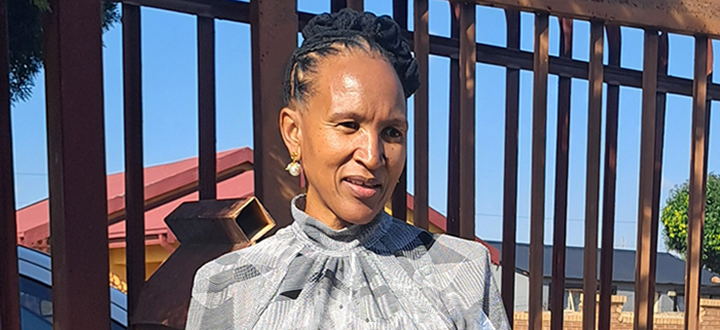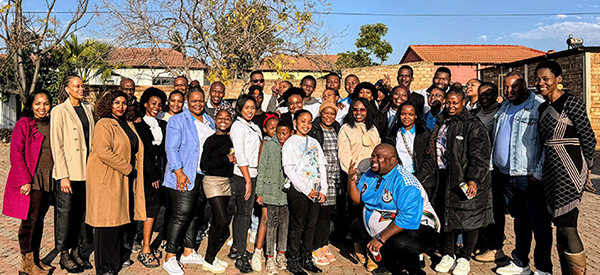College of Science, Engineering & Technology
Unisa researcher wins prestigious grant from WRC

Dr Hlengilizwe Nyoni, Instrument scientist and lab manager: iNanoWS, CSET, Unisa
Dr Hlengilizwe Nyoni, an instrument scientist and lab manager at the Unisa Institute of Nanotechnology and Water Sustainability (iNanoWS), has received a Water Research Commission (WRC) grant of R500 000 for a proposal entitled "Implementation of effect-based methods for water quality assessment: Combined strategy of passive sampling and bioassay measurements".
Expressing his sentiments about the funding, Nyoni says, "I feel thrilled and truly grateful for the opportunity to be amongst many who are contributing to the overall research strategic intent of iNanoWS in the College of Science, Engineering and Technology (CSET) at Unisa. I consider this award as a great responsibility in the service of humanity."
The award serves as third-stream income generation for Unisa. Explaining the importance and relevance of this for a university, in this instance through research funding, Nyoni says that since iNanoWS became an institute in June 2020, it was clear to him that it faced greater chances of receiving reduced funding. "Thus, third-stream income becomes more important and perhaps relevant now than ever before, in order to maintain the excellent world-class research standard that we at iNanoWS have all become accustomed to," he says.
Adding to this, Prof Thabo Nkambule, the Acting Director of iNanoWS, says that in the re-imagined research strategy of Unisa, especially that of CSET, where iNanoWS is housed, one of the core drivers of transformation is the generation or sourcing of third-stream income by researchers and scholars. "Being able to attract third-stream income, firstly, implies that the funders are giving a vote of confidence to the practicality and relevance of the research being done, but, equally so, this allows the university to leverage on funding to broaden its offering. In so doing, a wider spectrum of research that speaks to the needs of all stakeholders can be done and more students can be funded," says Nkambule.
As an institute, Nkambule adds that their key and most valued clients are their students. "Being able to attract external funding says we can provide more resources to students to carry out their research and, thus, equally, contribute to human capacity development in the field of science, engineering and technology. Without doubt such initiatives become a response to the President’s Thuma mina call for all of us to do the needful towards the National Development Plan 2030," Nkambule passionately elaborates.
Nyoni’s aim with the research is to develop a more holistic monitoring approach that integrates both bioassays and chemical analysis techniques in order to provide a more realistic base for water quality monitoring within the framework of integrated water quality management and water safety planning. The project involves case studies on the application of effect-based methods for evaluating the performance of treatment technologies (including conventional drinking water, water reuse, desalination and wastewater treatment plants) as part of water safety planning; characterising impacts to surface waters and determining potential impacts of wastewater discharges.
The social impact of the research
The success of this research work will result in the development of an all-inclusive toolbox for water quality assessment relevant to addressing the water-related socio-economic issues for all people. Research done to date has shown the co-presence of a variety of chemicals of concern, including agricultural chemicals, industrial chemicals, pharmaceuticals and personal care products, as well as their transformation products, in our water systems. "Exposure to these individual chemicals, through ingestion, inhalation or dermal absorption, poses a risk to ecosystems and human health. However, it is being increasingly recognised that targeted chemical monitoring and risk assessment methods cannot account for all the risks associated to exposure to emerging (unknown and unregulated) chemicals of concern, transformation products as well as chemical mixtures," Nyoni explains. Understanding risks associated with exposure to emerging contaminants in water requires a paradigm shift from the current approaches that reflect only a fraction of the overall chemical risk to those that allow for a more holistic assessment.
Nyoni explains that he was inspired to embark on research of this nature by the rising need of means for assessing water safety. He thanks his wife and children "for their understanding and faithfulness in reminding me that they are my number one team, my academic mentors professors Titus Msagati and Bheki Mamba, and the iNanoWS research team led by Prof Thabo Nkambule". He concluded by listing the factors that influenced him to choose this field of research as "an appreciation of the significance of the field of chemical and biological sciences, good inspirational exposure to various research themes within the field of water sustainability, a passion to find solutions to some of water related challenges, and being keen to contribute to addressing these challenges".
An astounding researcher
Nyoni has been hard at work and the proof is in the pudding; his academic achievements include
- playing an instrumental role in setting up world-class research facilities at iNanoWS.
- co-publishing over 30 articles in DHET accredited journals.
- supervising two master’s students to successful completion and two doctoral students awaiting results.
Over and above these achievements, Nyoni is also proud to have received his first ever research grants in his academic career, namely the WRC funding of half a million rand, and National Research Foundation (NRF) Thuthuka funding of R830 000 in the same year of funding for both: 2020–2022.
Affirming Nyoni’s hard work and the calibre of researcher he is, Kambule, who is the water scientist’s mentor and line manager, expressed jubilation at the funding news. "I would like to congratulate Dr Nyoni on this wonderful achievement. The Water Research Commission is by far one of the largest funders of water research globally and to get recognition from them through their prestigious research grants is very telling of the calibre of researcher and scholar that Dr Nyoni (and his team of students) is," says Nkambule.
Through its research activities, Unisa is critically contributing to the knowledge and information society, while advancing development and nurturing a critical citizenry.
* By Tshimangadzo Mphaphuli, Senior Journalist, Department of Institutional Advancement
Publish date: 2020-10-14 00:00:00.0


 Unisa wins bid to host IAMS General Assembly
Unisa wins bid to host IAMS General Assembly
 Cutting grass by day, pursuing Unisa studies by night
Cutting grass by day, pursuing Unisa studies by night
 Unisan’s research set to improve accident records management through AI
Unisan’s research set to improve accident records management through AI
 Koma e wetse: When tradition meets the harsh realities of modern livelihoods
Koma e wetse: When tradition meets the harsh realities of modern livelihoods
 Imbizo inspires youth
Imbizo inspires youth